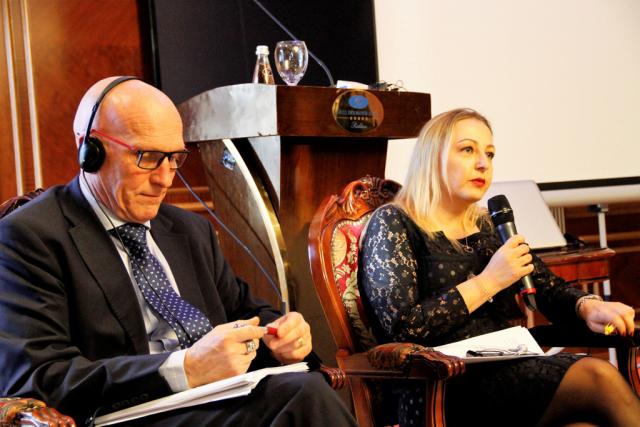Kosovo: Interviews with returned foreign fighters and their families
Wednesday, 06.12.2017.
14:55

Kosovo: Interviews with returned foreign fighters and their families
This is an independent assessment of returned foreign fighters, currently serving their sentences either in prison or under house arrest, as well as their families.Many distinguished guests honoured the event with their presence, including H. E. Ramush Haradinaj, the Prime Minister of Kosovo and H.E. Greg Delawie, Ambassador of the United States of America to Kosovo who were also the key note speakers at the event.
In her opening remarks, Ms. Alessandra Roccasalvo, UNDP Deputy Resident Representative said that Kosovo will face challenges at a time when Kosovar fighters will start returning from wars. "It is a difficult challenge for law-enforcement agencies because we do not know much about these individuals,” she said.
On this occasion, Prime Minister Haradinaj remarked: “The spreading of religious ideology, Islamic ideology has not been put to the service of religion, it does not aim the religion, but it is a dangerous agenda, it endangers Kosovo”. PM Haradinaj congratulated the UNDP for this report, which, he said, helps to understand the reasons and circumstances for making the youth join the movements, wars and ideologies that endanger, not only others, but also their families and lives. Further on, the Prime Minister said that although awareness in Kosovo has improved, propagandistic language remains worrying. “We are ready to repatriate all those returning in accordance with the law and obligations that we have, and we should take the responsibility to secure the life of each one", concluded Prime Minister Haradinaj.
U.S. Ambassador to Kosovo, Greg Delawie stated that Kosovo institutions should work in preventing young people from falling prey to violent extremist ideologies. "To be fully effective we must not allow radicals to recruit others. This report highlights that institutions should work with young people not to let them bow down to these pressures. I hope that this research presented today will be used" DELAWIE said.
The research assessment was undertaken to better understand the pull and push factors that make Kosovars join foreign terrorist groups, and support Kosovo institutions and international stakeholders in developing better policies and programmes for the prevention of violent extremism, as well as rehabilitation and reintegration programmes for returned foreign fighters.
It lists main push and pull factors that include:
Socio-economic challenges – understood in this case as a lack of opportunities and a poor standard of education – may have contributed to a creating an environment in which Kosovans are more vulnerable to propaganda from extremist groups.
Enablers and means of travel - Research and interviews with returned fighters point to a well-developed and organized recruitment network active in Kosovo, the former Yugoslav Republic of Macedonia, and Albania.
Identity, cause and ideology: empathy for the victims and a feeling of belonging - All eight interviewees described their reasons for travelling to fight in Syria as largely moral and religious in character.
The internet and social media facilitated communication and helped amplify radical views - The internet and social media have been identified as some of the main sources of information and socialization for recruitment and radicalization, and one of the main risk factors.
Reasons why women join the violent extremist movement - Our interviews suggest that women often feel more alienated than men. Relevant factors include an increased sense of vulnerability due to perceived Islamophobia in society, and also that they are generally in a weaker economic position. It also appears that the drive to find a better life and enjoy more religious freedoms was a strong motivation among women.
UNDP is supporting Prevention of Violent Extremism in Kosovo via three areas: by undertaking independent research on the phenomenon of radicalization; by piloting support mechanisms at municipal level such as the referral mechanism in Gjilan/Gnjilane; and by supporting the Ministry of Education on implementing the CVE Action Plan. UNDP is also working in partnership with UNV by implementing a pilot initiative on youth empowerment and engagement in Kaçanik/Kačanik, by providing opportunities to youth to engage in meaningful and productive activities.
Read the Report here
To read more about the recommendations to prevent violent extremism at community level, read the report here
























































Komentari 4
Pogledaj komentare